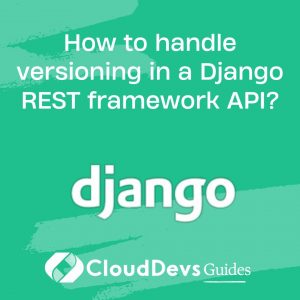How do I implement data validation and serialization in Django REST framework?
Implementing data validation and serialization in Django REST framework (DRF) is a crucial aspect of building robust and reliable APIs. DRF provides powerful tools for validating incoming data and serializing outgoing data. Here’s how you can achieve this:
- Data Validation with Serializers:
Start by defining serializers for your Django models. Serializers in DRF determine how data is validated and converted to Python data types. You can create serializers using DRF’s built-in classes like `serializers.Serializer` or `serializers.ModelSerializer`. Here’s a basic example of a serializer for a model:
```python from rest_framework import serializers from .models import YourModel class YourModelSerializer(serializers.ModelSerializer): class Meta: model = YourModel fields = '__all__' ```
- Validation Rules:
Define validation rules within your serializer using fields like `CharField`, `IntegerField`, etc. You can set attributes like `required`, `max_length`, and `validators` to enforce specific rules.
```python class YourModelSerializer(serializers.ModelSerializer): class Meta: model = YourModel fields = '__all__' name = serializers.CharField(max_length=100, required=True) age = serializers.IntegerField(min_value=0) ```
- Custom Validation:
For more complex validation logic, you can implement custom validation methods in your serializer. Use methods like `validate_<field_name>` to perform field-specific validation.
```python
class YourModelSerializer(serializers.ModelSerializer):
class Meta:
model = YourModel
fields = '__all__'
def validate_age(self, value):
if value < 18:
raise serializers.ValidationError("Age must be 18 or older.")
return value
```
- Handling Serialization:
Serialization is the process of converting Python objects (e.g., Django models) into JSON or other formats suitable for API responses. DRF handles this automatically when you use serializers in views.
- Deserialization:
Deserialization is the reverse process, where incoming JSON data is converted into Python objects. DRF serializers handle this as well, ensuring that the incoming data adheres to your validation rules.
- Use in Views:
Integrate your serializers into DRF views. Typically, you’ll use serializers in views like `ListCreateAPIView` and `RetrieveUpdateDestroyAPIView` to handle CRUD operations for your API endpoints.
- Response and Error Handling:
DRF also manages HTTP responses and error handling. It automatically returns error responses with appropriate status codes when validation fails.
By following these steps and leveraging DRF’s serializers, you can ensure that your Django REST framework API enforces data validation rules and properly serializes data for consistent and reliable interactions with clients. This helps maintain data integrity and improves the overall security of your API.






